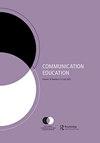Getting the attention of online learners
IF 0.8
Q3 COMMUNICATION
引用次数: 3
Abstract
Due to the increase in online learning over the years, it is particularly important to understand how students can learn effectively in the digital space (Morrealeet al., 2021). The need for more online pedagogy research was made especially clear by the urgent shift to online learning during the novel coronavirus (COVID-19) pandemic in early 2020, which left teachers at all levels of education grappling with how to move their classrooms online while continuing to encourage learning (Lang, 2021). Lowes and Lin (2015) discovered that students often desire better self-regulation skills in online learning environments and perceive that such skills may be instrumental in their success. Self-regulation in an online course includes the ability to be interested, organized, responsible, engaged, and punctual (Roblyer & Marshall, 2002). It is evident that self-regulation is important in online environments due to the distance between the instructor and the other students in the class, so instructors must help students recognize their "locus of control" (LOC) and how it affects their learning behaviors (Lowes & Lin, 2015). This article evaluates how the online learning environment may present unique challenges to other elements of self-regulation such as organization (e.g., the first encounter with a paperless course), or advantages for those that struggle with punctuality in a face-to-face scenario (e.g., no commute) (Arias et al., 2018, Roblyer & Marshall, 2002). These discrepancies must be explored further to discern ways in which instructional communicators can help students adjust to online courses.吸引在线学习者的注意力
由于多年来在线学习的增加,了解学生如何在数字空间中有效学习尤为重要(Morrealeet al., 2021)。2020年初,新型冠状病毒(COVID-19)大流行期间,人们迫切需要转向在线学习,这表明需要进行更多的在线教学法研究,各级教育的教师都在努力解决如何在继续鼓励学习的同时将课堂转移到网上的问题(Lang, 2021)。Lowes和Lin(2015)发现,学生往往希望在在线学习环境中获得更好的自我调节技能,并认为这种技能可能有助于他们的成功。在线课程中的自我调节包括兴趣、组织、负责、参与和准时的能力(Roblyer & Marshall, 2002)。很明显,由于教师与课堂上其他学生之间的距离,自我调节在网络环境中很重要,因此教师必须帮助学生认识到他们的“控制点”(LOC)以及它如何影响他们的学习行为(Lowes & Lin, 2015)。本文评估了在线学习环境如何对自我调节的其他要素提出独特的挑战,如组织(例如,第一次遇到无纸化课程),或为那些在面对面场景中与准时性作斗争的人带来的优势(例如,没有通勤)(Arias等人,2018,Roblyer & Marshall, 2002)。这些差异必须进一步探讨,以找出教学传播者可以帮助学生适应在线课程的方法。
本文章由计算机程序翻译,如有差异,请以英文原文为准。
求助全文
约1分钟内获得全文
求助全文
来源期刊

COMMUNICATION EDUCATION
EDUCATION & EDUCATIONAL RESEARCH-
CiteScore
3.10
自引率
34.80%
发文量
47
期刊介绍:
Communication Education is a peer-reviewed publication of the National Communication Association. Communication Education publishes original scholarship that advances understanding of the role of communication in the teaching and learning process in diverse spaces, structures, and interactions, within and outside of academia. Communication Education welcomes scholarship from diverse perspectives and methodologies, including quantitative, qualitative, and critical/textual approaches. All submissions must be methodologically rigorous and theoretically grounded and geared toward advancing knowledge production in communication, teaching, and learning. Scholarship in Communication Education addresses the intersections of communication, teaching, and learning related to topics and contexts that include but are not limited to: • student/teacher relationships • student/teacher characteristics • student/teacher identity construction • student learning outcomes • student engagement • diversity, inclusion, and difference • social justice • instructional technology/social media • the basic communication course • service learning • communication across the curriculum • communication instruction in business and the professions • communication instruction in civic arenas In addition to articles, the journal will publish occasional scholarly exchanges on topics related to communication, teaching, and learning, such as: • Analytic review articles: agenda-setting pieces including examinations of key questions about the field • Forum essays: themed pieces for dialogue or debate on current communication, teaching, and learning issues
 求助内容:
求助内容: 应助结果提醒方式:
应助结果提醒方式:


